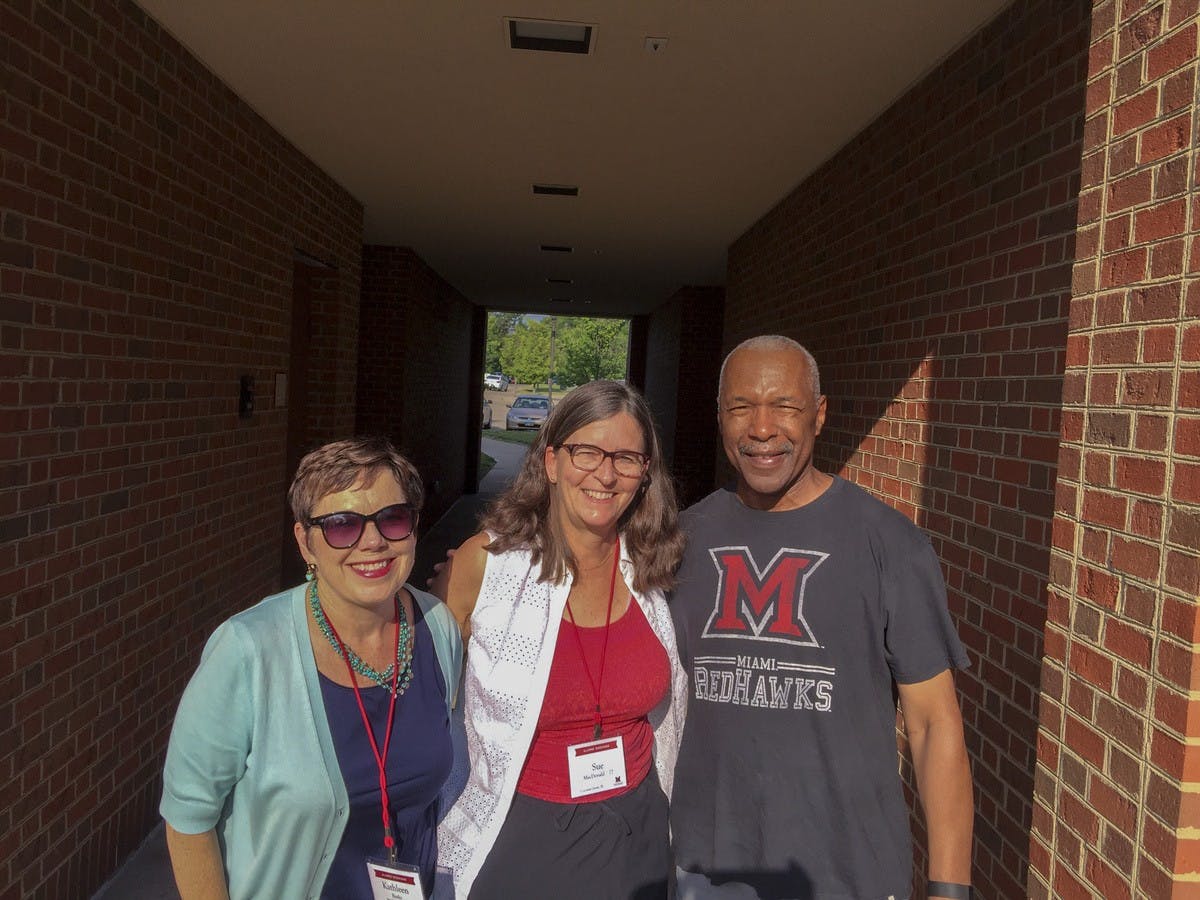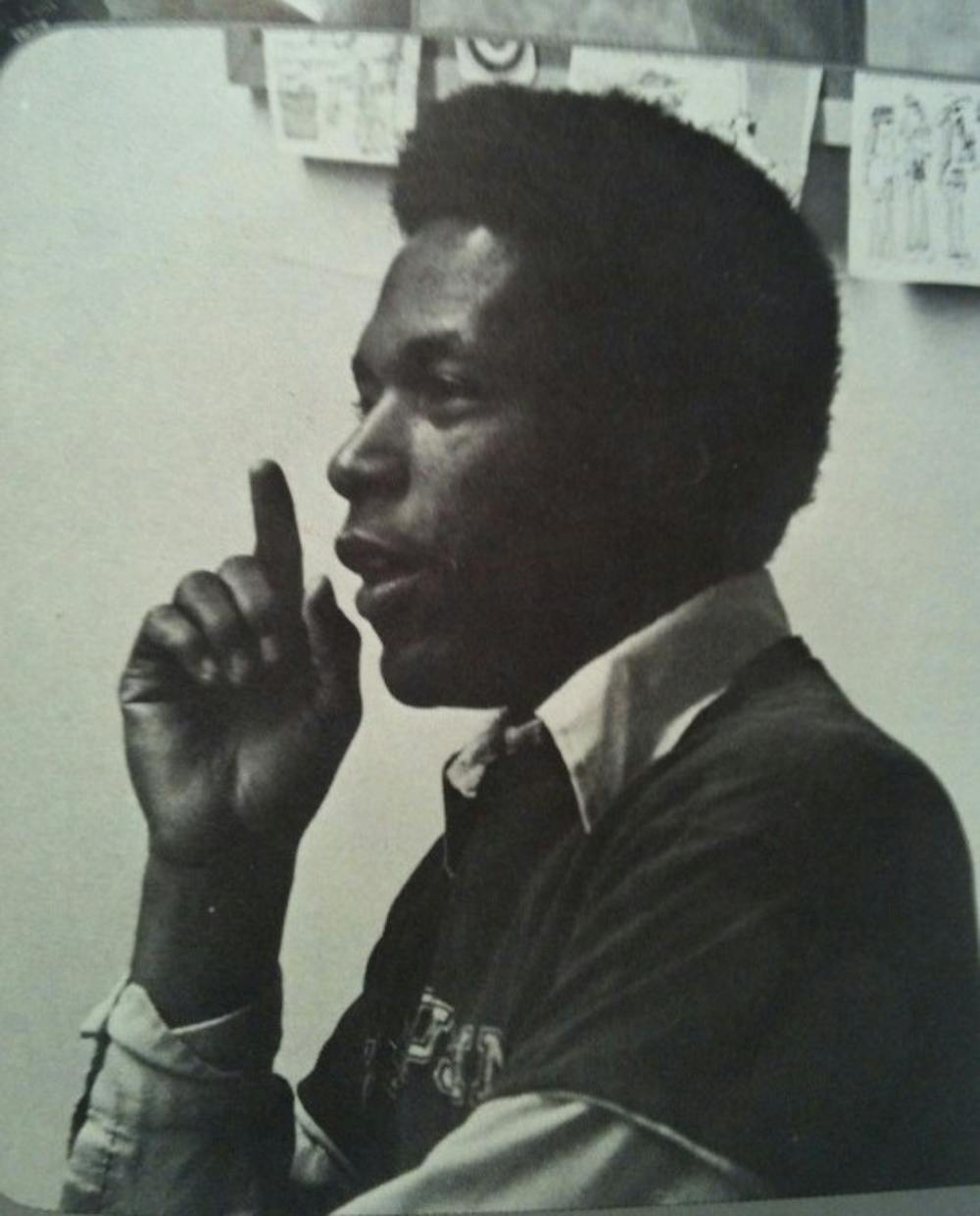The first time Terence Moore stepped foot on Miami University’s campus, he was 12 years old. He and his dad were attending a basketball tournament in the newly built Millett Hall.
Moore said this experience was like love at first sight.
“It was almost like a spiritual happening,” Moore said. “I'm 12 years old, and it was like, ‘Whoa, this is amazing.’ ... So I always had this emotional pull to Miami, just from that one moment.”
Years later, when researching colleges, Moore already knew he wanted to be a sports journalist. Remembering his first experience at Miami, he took a chance and called The Miami Student office to do more research.
Unfortunately for Moore, it was summer break.
“I remember my dad was saying, ‘Oh, there's not going to be anybody down there in the summertime, you're probably not going to get anybody,’” Moore said.
As fate would have it, one staff member was taking summer classes and happened to be on campus – Kathleen Burke, the editor-in-chief of The Student.
Moore explained his intentions, and Burke invited him to campus to learn more about The Student. She and Moore are still good friends to this day.
“I do believe there's no such thing as coincidence,” Moore said.
Moore, who attended Miami from 1974 to 1978, joined The Student his first day on campus. At the time, there was no journalism major at Miami, so Moore decided to major in economics.
“I was told way back in high school to always have something to fall back on because journalism was as competitive back then as it is now,” Moore said.
Moore’s first assignment for The Student was to cover a soccer game for the sports section. He knew nothing about soccer but was willing to cover anything to get his chance at writing.
Enjoy what you're reading?
Signup for our newsletter
He fell in love with the newspaper after just one assignment and would go on to continue covering sports and even develop the MAC Report, a sports column that covered all teams in the Mid-American Conference (MAC).
At the end of his junior year, Moore became the sports editor for The Student.
Moore was both the first Black full-time writer and the first Black editor for TMS.
When he graduated in 1978, Moore said there were approximately 15,000 undergraduate students on campus – only 121 were Black.
Although diversity on campus was low, Moore said he never faced any issues at The Student. In fact, it became his safe space.
“The four years I worked at The Miami Student, I never had a hit of a problem there at all, racially,” Moore said. “As a matter of fact, we were like our own little fraternity.”
Sue MacDonald was the editor-in-chief of The Student during Moore’s junior year.
“I never thought of [Terence] as a Black reporter,” MacDonald said. “He was just a really good sports writer and a really good sports editor … if you came in and you could write a complete sentence and you wanted to work for The Miami Student, come on board.”
During the time Moore and MacDonald worked for The Student, a new interest in journalism was emerging in response to the Watergate scandal that led to President Nixon’s resignation.
“There were some people in the country that hated the newspapers for bringing down the president, [but] there were still a lot of people, especially our generation, that were really inspired by the power of the press,” MacDonald said.
Members of The Student followed suit.
“We looked at ourselves as being a Washington Post and the Miami administration being like the Nixon administration,” Moore said.
Oxford still also had its own newspaper at the time, the Oxford Press. The Student used the Oxford Press office for its newspaper production two nights a week, although it wasn’t always smooth sailing.
“We had some classic near misses with them,” Moore said. “They were old school journalists, the Oxford Press, and they did not play. And you can imagine they come in and here's a bunch of college kids with pizza boxes all over the place.”
Despite the long nights and close calls, Moore said the The Student staff was still extremely proud to be able to produce a successful newspaper.
“We treated [it] as if we were a real newspaper, and we kicked tail,” Moore said. “We took pride in that.”
Moore would also submit stories ideas to The Cincinnati Enquirer. Many were rejected, but he did have a few strokes of luck and was able to get his story ideas published.
“And then the next thing you know, I'm getting a call and they said, ‘Hey, you want to do an internship here?’”
Moore said that while Miami is referenced as the Cradle of Coaches, he calls it the ‘Cradle of Sports Writers’ due to the amount of students who have gone on to be successful sports journalists, including himself.
Eight days after graduating from Miami, Moore began working at The Enquirer.
Since then, he’s done sports reporting for publications including The San Francisco Examiner, The Atlanta Journal-Constitution, ESPN and the National Football League.
Currently, Moore works as a national columnist for Forbes, writes opinion pieces for CNN, is an MSNBC sports contributor and has a YouTube channel called Atlanta Sports Unlimited.
Moore also has a weekly show called Sports Zone Sunday for the local ABC affiliate in Atlanta, the most-watched ABC affiliate in the country.
“We have the highest ratings consistently in the country and have been for years,” Moore said. “So I can think I had a little something to do with that.”
Moore has covered 30 Super Bowls, multiple World Series and NBA Finals games, major prize fights, college football bowl games and auto races including the Daytona 500 and Indianapolis 500.
In 1999, the National Association of Black Journalists honored Moore for being the longest-running African-American sports columnist in the history of major newspapers.
Moore also stays true to his roots and has been a visiting professor of journalism at Miami for seven years while also having served on the alumni board for six. He couldn’t teach this year, though, due to faculty cutbacks caused by the COVID-19 pandemic.

Terence Moore teaches at Miami as a visiting assistant professor, but due to budgeting constraints caused by the pandemic he was not able to teach this year.
Senior Bennett Wise first met Moore when he was visiting Miami as a senior in high school after being put in contact with him by another alum. While at the Indianapolis airport on his way to Oxford, he got a call from Moore. The two talked for 45 minutes as Moore tried to sell him on Miami’s journalism program.
Moore’s efforts worked.
“He helped shape who I am as a journalist and then also how I approach sports,” Wise said. “I can't watch them in the same light. If I'm watching [sports] on TV, I'm just constantly thinking about angles and ways I would be reporting that event that's going on. And that's from Terence”.
A few years after his initial conversation with Moore, Wise found himself in Moore’s journalism 350 class. He credits Moore’s teachings as a large part of his educational experience.
“The foundation of what I've learned in journalism,” Wise said, “I'd say 90% of it has come from Terence and his class.”




